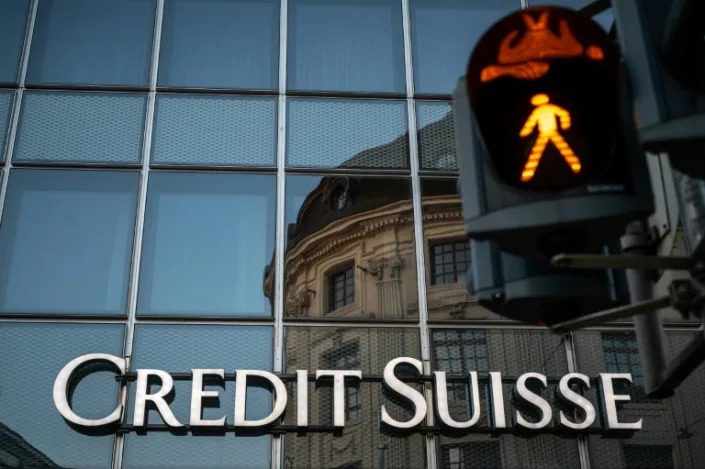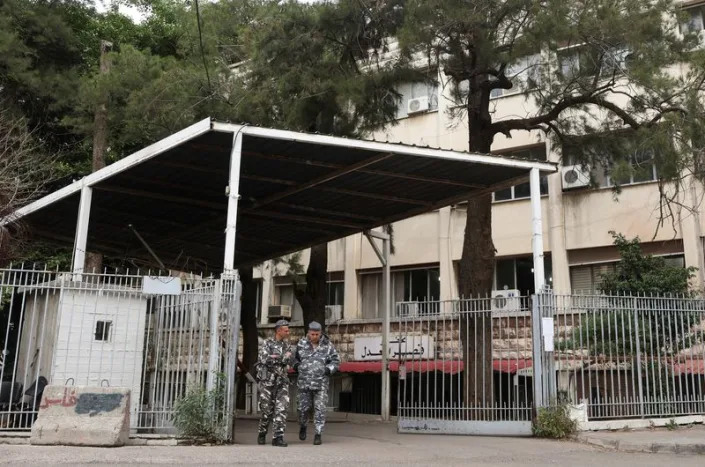Bank takeover prevented Swiss economy collapse: minister
AFP
Sat, April 8, 2023

Swiss Finance Minister Karin Keller-Sutter said Switzerland's economy would probably have collapsed had Credit Suisse gone bankrupt, in an interview published Sunday.
Keller-Sutter told Le Temps newspaper that the government had acted in the country's best interests in swiftly arranging the takeover of Switzerland's second-biggest bank by its larger domestic rival UBS.
Amid fears of a global banking crisis last month, investor confidence in Credit Suisse collapsed on March 15, with the government then orchestrating a takeover during the weekend before the markets reopened on March 20.
Some 109 billion Swiss francs ($120 billion) have been put on the table between government guarantees and the liquidity made available by the Swiss central bank.
"Given the circumstances, we acted as best we could to minimise the burden for the state and the taxpayers," Keller-Sutter said.
"Without determined intervention by the authorities, the alternative would have been a bankruptcy of Credit Suisse on Monday morning, accompanied by a probable collapse of the Swiss economy."
Like UBS, Credit Suisse was among the 30 banks worldwide deemed of global importance to the international banking system and therefore too big to fail.
But it suffered a string of scandals in recent years, and after three US regional banks collapsed in March, it was left looking like the weakest link in the chain.
- Double-quick deal -
The takeover talks were hastily conducted at Keller-Sutter's finance ministry in Bern and the $3.25 billion deal was announced on the evening of March 19.
"The bank would have gone bankrupt on Monday, March 20. For what? Because over the years there has been a culture that seems to have created the wrong incentives. Because there have been many scandals," said Keller-Sutter.
As for whether any executives would be brought to justice, she said: "It's difficult and complex."
She said the government's priority was to complete the merger. UBS said Wednesday it should close the takeover within the coming months.
The finance minister said it was too soon to talk about the future structure of UBS, which will become a mega-bank with some $5 trillion in invested assets.
Keller-Sutter said the government would have to analyse what happened in full, and then adapt the regulations on banks considered too big to fail.
"But there are limits. Let's not forget that... confidence cannot be regulated."
rjm/cdw
AFP
Sat, April 8, 2023

Swiss Finance Minister Karin Keller-Sutter said Switzerland's economy would probably have collapsed had Credit Suisse gone bankrupt, in an interview published Sunday.
Keller-Sutter told Le Temps newspaper that the government had acted in the country's best interests in swiftly arranging the takeover of Switzerland's second-biggest bank by its larger domestic rival UBS.
Amid fears of a global banking crisis last month, investor confidence in Credit Suisse collapsed on March 15, with the government then orchestrating a takeover during the weekend before the markets reopened on March 20.
Some 109 billion Swiss francs ($120 billion) have been put on the table between government guarantees and the liquidity made available by the Swiss central bank.
"Given the circumstances, we acted as best we could to minimise the burden for the state and the taxpayers," Keller-Sutter said.
"Without determined intervention by the authorities, the alternative would have been a bankruptcy of Credit Suisse on Monday morning, accompanied by a probable collapse of the Swiss economy."
Like UBS, Credit Suisse was among the 30 banks worldwide deemed of global importance to the international banking system and therefore too big to fail.
But it suffered a string of scandals in recent years, and after three US regional banks collapsed in March, it was left looking like the weakest link in the chain.
- Double-quick deal -
The takeover talks were hastily conducted at Keller-Sutter's finance ministry in Bern and the $3.25 billion deal was announced on the evening of March 19.
"The bank would have gone bankrupt on Monday, March 20. For what? Because over the years there has been a culture that seems to have created the wrong incentives. Because there have been many scandals," said Keller-Sutter.
As for whether any executives would be brought to justice, she said: "It's difficult and complex."
She said the government's priority was to complete the merger. UBS said Wednesday it should close the takeover within the coming months.
The finance minister said it was too soon to talk about the future structure of UBS, which will become a mega-bank with some $5 trillion in invested assets.
Keller-Sutter said the government would have to analyse what happened in full, and then adapt the regulations on banks considered too big to fail.
"But there are limits. Let's not forget that... confidence cannot be regulated."
rjm/cdw
French prosecutors name bank chairman a suspect in Lebanese central bank probe

Lebanese police stand outside the Justice Palace as

Lebanese police stand outside the Justice Palace as
Lebanon's central bank governor Riad Salameh attends a court hearing
Sat, April 8, 2023
By Layli Foroudi, David Gauthier-Villars and Timour Azhari
Paris (Reuters) - French prosecutors said they have put a Lebanese banker under formal investigation, the latest move in a cross-border probe looking into whether Lebanon’s central bank governor Riad Salameh, embezzled vast sums of public funds.
The Lebanese banker, Marwan Kheireddine, who is the chairman of Lebanon's AM Bank, is suspected of participation in a criminal association and aggravated money laundering, a spokesperson at the Paris office of the National Financial Prosecutors said on Friday.
Kheireddine, who was in France on March 24 when prosecutors notified him of the preliminary charges, was not kept in custody, the spokesperson said, but he was told not to leave the country and his passport was confiscated.
Kheireddine did not respond to phone calls and text messages. A lawyer who, Reuters was told represents him, said he could not confirm being Kheireddine's counsel.
Salameh, who has been at the helm of the central bank for three decades, is being investigated in Lebanon, in France and in at least four other European countries over accusations of stealing hundreds of millions of dollars and laundering some of the proceeds abroad.
Salameh has denied the accusations, saying he is being made a scapegoat for Lebanon's financial crisis that erupted in 2019.
According to people familiar with the French and Lebanese probes, Kheireddine is suspected of having allowed Salameh to process irregular fund transfers through AM Bank.
A lawyer for Salameh, Pierre-Olivier Sur, declined to comment on the allegations Kheireddine colluded with the governor. The Lebanese bank did not respond to a message seeking comment.
In January, Kheireddine was questioned by visiting European prosecutors in Beirut, who asked him about accounts at AM Bank containing large sums of money belonging to Salameh, according to people familiar with the interrogation.
Bank statements seen by Reuters show how the Salameh accounts at AM Bank ballooned from $15 million in 1993 to more than $150 million by 2019.
Lebanese prosecutors suspect the accounts, from which regular cash withdrawals were made, were used to conceal money laundering activity, a Lebanese judicial source said on Saturday.
Through lawyers, Salameh has denied using his AM Bank accounts to launder money, saying interests he capitalized on deposits explain why his savings rose.
Kheireddine served as a Lebanese minister of state between 2011 and 2013 and ran unsuccessfully for parliament in 2022 on a list backed by the powerful Iran-backed political party and armed group Hezbollah.
French prosecutors, who have not formally named Salameh a suspect, have summoned him for a hearing in Paris on May 16, according to Salameh's lawyer, Sur.
Sur said late on Friday it was not clear whether his client would be able to come to the hearing because his travels are restricted as part of Lebanese investigations.
Sur told Reuters he may challenge the hearing itself on procedural grounds.
According to the lawyer, French prosecutors have summoned his client with a view of naming him a formal suspect. Yet, in March, they came to Beirut, and questioned him as a "simple witness," he said.
If French prosecutors suspected Salameh of wrongdoing, they could not hear him as a witness, Sur said. The fact they did creates an "insurmountable gap" the lawyer said.
(Reporting by Layli Foroudi in Paris, David Gauthier-Villars in Istanbul and Timour Azhari in Beirut; Writing by David Gauthier-Villars; Editing by Tomasz Janowski)
Sat, April 8, 2023
By Layli Foroudi, David Gauthier-Villars and Timour Azhari
Paris (Reuters) - French prosecutors said they have put a Lebanese banker under formal investigation, the latest move in a cross-border probe looking into whether Lebanon’s central bank governor Riad Salameh, embezzled vast sums of public funds.
The Lebanese banker, Marwan Kheireddine, who is the chairman of Lebanon's AM Bank, is suspected of participation in a criminal association and aggravated money laundering, a spokesperson at the Paris office of the National Financial Prosecutors said on Friday.
Kheireddine, who was in France on March 24 when prosecutors notified him of the preliminary charges, was not kept in custody, the spokesperson said, but he was told not to leave the country and his passport was confiscated.
Kheireddine did not respond to phone calls and text messages. A lawyer who, Reuters was told represents him, said he could not confirm being Kheireddine's counsel.
Salameh, who has been at the helm of the central bank for three decades, is being investigated in Lebanon, in France and in at least four other European countries over accusations of stealing hundreds of millions of dollars and laundering some of the proceeds abroad.
Salameh has denied the accusations, saying he is being made a scapegoat for Lebanon's financial crisis that erupted in 2019.
According to people familiar with the French and Lebanese probes, Kheireddine is suspected of having allowed Salameh to process irregular fund transfers through AM Bank.
A lawyer for Salameh, Pierre-Olivier Sur, declined to comment on the allegations Kheireddine colluded with the governor. The Lebanese bank did not respond to a message seeking comment.
In January, Kheireddine was questioned by visiting European prosecutors in Beirut, who asked him about accounts at AM Bank containing large sums of money belonging to Salameh, according to people familiar with the interrogation.
Bank statements seen by Reuters show how the Salameh accounts at AM Bank ballooned from $15 million in 1993 to more than $150 million by 2019.
Lebanese prosecutors suspect the accounts, from which regular cash withdrawals were made, were used to conceal money laundering activity, a Lebanese judicial source said on Saturday.
Through lawyers, Salameh has denied using his AM Bank accounts to launder money, saying interests he capitalized on deposits explain why his savings rose.
Kheireddine served as a Lebanese minister of state between 2011 and 2013 and ran unsuccessfully for parliament in 2022 on a list backed by the powerful Iran-backed political party and armed group Hezbollah.
French prosecutors, who have not formally named Salameh a suspect, have summoned him for a hearing in Paris on May 16, according to Salameh's lawyer, Sur.
Sur said late on Friday it was not clear whether his client would be able to come to the hearing because his travels are restricted as part of Lebanese investigations.
Sur told Reuters he may challenge the hearing itself on procedural grounds.
According to the lawyer, French prosecutors have summoned his client with a view of naming him a formal suspect. Yet, in March, they came to Beirut, and questioned him as a "simple witness," he said.
If French prosecutors suspected Salameh of wrongdoing, they could not hear him as a witness, Sur said. The fact they did creates an "insurmountable gap" the lawyer said.
(Reporting by Layli Foroudi in Paris, David Gauthier-Villars in Istanbul and Timour Azhari in Beirut; Writing by David Gauthier-Villars; Editing by Tomasz Janowski)
No comments:
Post a Comment